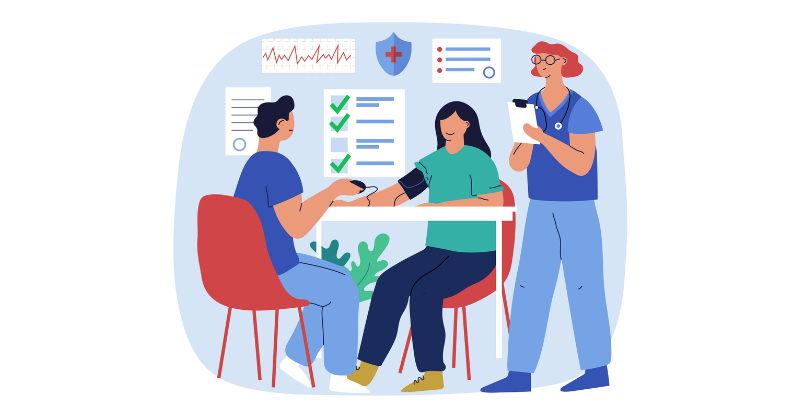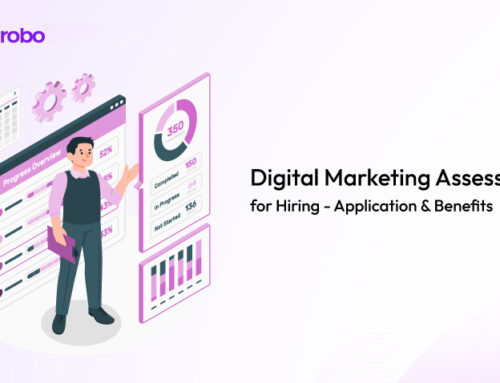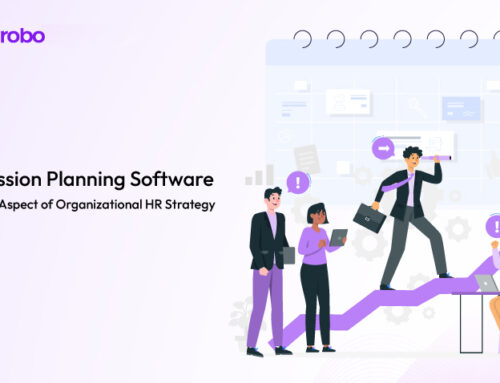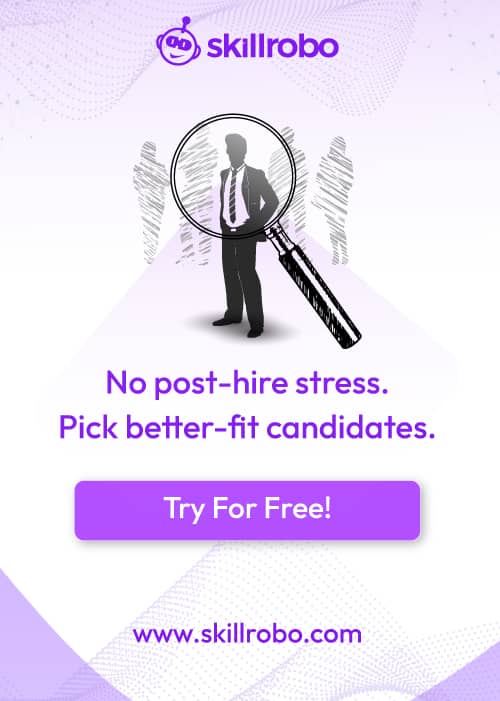Table of Contents
Related articles

An individual’s personality, dominant features, preferences, behavior style, motives, etc. are understood and evaluated via personality tests. A personality test evaluates a person’s personality and behavioral traits which help make practical decisions like employing better workers who fit the organization’s culture or working methods.
Employers can detect the necessary personality attributes in candidates by using personality tests. Candidates for a particular job role can be filtered by a recruiter based on underlying personality qualities. A personality test facilitates a seamless candidate search for talent acquisition professionals.
Read on to understand more about the personality test.
What is a Personality Test?
An assessment used to determine a person’s personality traits and characteristics is called a personality test. These assessments often involve a series of questions or other methods for learning about a person’s preferences, actions, and attitudes in various contexts.
Personality tests come in a variety of forms, each with its own methodology and goal. While some tests may utilize more casual techniques to assess personality traits, others may be based on well-established psychological theories. Many uses for personality tests exist, such as career planning, self-awareness, and relationship counseling.
Why do Organizations Need Personality Tests in Hiring?
Completely understanding someone is challenging. Although personality tests may not always be completely correct, they are a good place to start your assessment because they provide you with information you might not have otherwise recognized. These insights are priceless for both one’s professional and personal development. Personality tests are often used by organizations as a tool to assess the personality traits of job candidates during the hiring process. Here are some reasons why organizations use personality tests in hiring:
Predicting Job Performance:
Personality tests can be helpful in predicting job performance by assessing traits such as conscientiousness, emotional stability, and agreeableness, which are considered important for many job roles. Employers can use personality tests to identify candidates who have the potential to perform well in the job and fit into the company culture.
Reducing Turnover:
Hiring the right person for a job can be a challenging task, and if not done properly, it can lead to high employee turnover. Personality tests can help employers reduce turnover rates by identifying candidates who have a better fit for the job and the organization’s values.
Avoiding Biases:
Personality tests are designed to be objective and standardized, making it easier for employers to avoid any biases that might arise during the hiring process. This helps ensure that all candidates are assessed on the same criteria, giving everyone an equal chance to be considered for the job.
Identifying Development Needs:
These tests can also be used to identify areas where candidates might need further development, which can help organizations tailor their training and development programs to meet the specific needs of their employees.
Assessing Cultural Fit:
Employers can use personality tests to assess the cultural fit of job candidates. By looking at a candidate’s personality traits, values, and work style, employers can determine whether they will fit well with the company’s culture and work environment.
Types of Personality Tests
The key facets of a person’s personality, including attitude, compatibility, and performance, can be revealed by taking one of the many personality type tests on the market. This is a list of popular free personality test categories that you may take online.
Myers-Briggs Type Indicator (MBTI):
The Myers-Briggs Type Indicator (MBTI) is one of the most widely used personality tests in the world. It assesses an individual’s preferences in four areas: extraversion vs. introversion, sensing vs. intuition, thinking vs. feeling, and judging vs. perceiving. These preferences result in one of 16 possible personality types, each with its own unique strengths and weaknesses. However, this personality type exam does not assess characteristics like abnormality or malfunction.
The MBTI is particularly useful for workforce planning because it can help identify how individuals prefer to work and communicate, which can help managers tailor their management style accordingly. For example, an introverted employee may prefer written communication over face-to-face meetings, while an extrovert may thrive in a group brainstorming session.
Big Five Personality Test:
The Big Five Personality Test, often known as the OCEAN Personality Test, is the personality test idea that is currently most largely recognized by psychologists. As compared to other psychometric testing methods used in the corporate environment, the Big Five test is one of the finest theories for personality type tests.
This test is a widely used personality framework that assesses individuals on five dimensions: openness, conscientiousness, extraversion, agreeableness, and neuroticism. These dimensions are believed to capture the most important aspects of personality, and research has shown that they are predictive of a wide range of life outcomes.
The Big Five Personality Test, also known as the Five Factor Model (FFM) or the OCEAN model, is a widely used tool in psychology that seeks to identify and measure five broad dimensions of personality. These five dimensions are:
- Openness to experience: This dimension measures an individual’s willingness to try new things and their level of creativity, imagination, and curiosity.
- Conscientiousness: This dimension measures an individual’s level of organization, self-discipline, and responsibility.
- Extraversion: This extraversion measures an individual’s level of sociability, assertiveness, and need for stimulation.
- Agreeableness: This dimension measures an individual’s level of cooperativeness, empathy, and concern for others.
- Neuroticism: Neuroticism measures an individual’s level of emotional instability, anxiety, and vulnerability to stress.
The Big Five Personality Test consists of a series of questions or statements that the individual is asked to rate on a scale from 1 to 5, with 1 indicating strong disagreement and 5 indicating strong agreement. These responses are then used to calculate the individual’s scores on each of the five dimensions.
This test has been found to have high levels of reliability and validity, meaning that it consistently produces accurate and meaningful results. It is used in a variety of settings, including clinical psychology, personality research, and human resources.
DISC Personality Test:
One of the most popular personality assessments for hiring is called DISC, and it assists candidates in developing a better understanding of their personalities and interpersonal styles. This tool is used by recruiters to determine a candidate’s personality type at work. It aids in reducing workplace tension or team strife. Employers utilize personality tests to evaluate applicants’ communication, collaboration, teamwork, and productivity.
The DISC test measures an individual’s behavioral traits across four dimensions:
- Dominance: This dimension measures an individual’s level of assertiveness, control, and ambition. Individuals who score high on dominance tend to be confident, decisive, and results-oriented.
- Influence: This dimension measures an individual’s level of sociability, communication, and persuasion. Individuals who score high on influence tend to be outgoing, optimistic, and able to motivate others.
- Steadiness: This dimension measures an individual’s level of patience, collaboration, and supportiveness. Individuals who score high on steadiness tend to be reliable, cooperative, and team-oriented.
- Conscientiousness: This dimension measures an individual’s level of detail orientation, persistence, and orderliness. Individuals who score high on conscientiousness tend to be methodical, precise and focused on quality.
The DISC test normally asks the applicant to assess a series of statements or questions on a scale of 1 to 5, with 1 denoting significant disagreement and 5 denoting strong agreement. The scores for the person on each of the four dimensions are then determined using the replies.
It’s crucial to remember that the DISC test is not meant to be used as a tool for diagnosing mental health conditions. Also, without further information and context, it should not be used to make decisions regarding employment, promotion, or other possibilities, even though it can offer useful information about a person’s behavioral style.
The Enneagram Test:
The Enneagram test differentiates nine types of human personality s depending on the three types of intellect: emotional, instinctive, and mental. The relationship between the three facets of intellect, a person’s unconscious anxieties, and their drive to conquer those fears creates the foundation of each Enneagram personality type. The Enneagram personality test identifies defense mechanisms, vices, and attentional styles.
The Enneagram personality test assesses a person’s behavioral tendencies, emotional intelligence, and capacity for forming relationships at work and in their personal life. Compared to any other personality framework, the information obtained from this personality test yields precise and trustworthy results. Deep insights into numerous personality types, motives, values, compatibility, and work preferences are also provided by the integrated Enneagram test.
The Enneagram Test measures an individual’s personality traits across nine different types, each with its own set of characteristics, motivations, and behaviors. The nine types are:
- The Reformer: Rational, principled, and self-controlled
- The Helper: Empathetic, caring, and altruistic
- The Achiever: Ambitious, driven, and success-oriented
- The Individualist: Creative, expressive, and emotional
- The Investigator: Analytical, curious, and reserved
- The Loyalist: Responsible, loyal, and anxious
- The Enthusiast: Spontaneous, optimistic, and adventurous
- The Challenger: Assertive, confident, and powerful
- The Peacemaker: Calm, agreeable, and accommodating
Keirsey Temperature Sorter:
The Keirsey Temperament Sorter (KTS) is a personality assessment tool developed by psychologist David Keirsey. It is designed to help individuals understand their personality type and how they interact with the world around them.
The KTS is based on the Myers-Briggs Type Indicator (MBTI) and classifies individuals into one of four temperament groups:
- Guardians: Guardians are trustworthy, dedicated people who keep society’s machinery in motion. They respect authority because they are cooperative and concrete, which means they adhere to the rules. They value traditions and conventions and are committed to upholding the law. The Keirsey Group estimates that 40% to 45% of people on the planet are Guardians.
- Artisans: Spontaneous and impulsive individuals who enjoy taking risks and living in the moment. They can be impetuous in their ongoing search for adventure and excitement, and they are also eager to take chances and break the law. The Keirsey Group estimates that 30% to 35% of individuals globally are craftspeople.
- Idealists: Idealists frequently emphasize personal development, self-improvement, and helping others realize their full potential. They firmly believe in working cooperatively to pursue what could be rather than what is since they are abstract and cooperative. They tend to choose professions that allow them to assist people since they are devoted, trustworthy, and kind. The Keirsey Group estimates that 15% to 20% of people worldwide are idealists.
- Rationals: Most uncommon of the four temperaments is rationalism. Rationals are systems analysts who take pleasure in deciphering systems (whether those systems are organic, social, mechanical, or anything else) and figuring out how to enhance them. They are pragmatic in their approach and interested in the abstract ideas that underpin the systems that attract them because they are abstract and utilitarian.
Rational people are Intelligent, independent thought, and logical. They frequently become totally absorbed in the issue they are attempting to resolve, which can make them appear distant or remote. Only 5% to 10% of people worldwide, according to the Keirsey Group, are rational.
Each of these groups is further divided into four subcategories, resulting in a total of 16 distinct personality types. The KTS uses a series of questions to determine an individual’s temperament and personality type.
The KTS is often used in career counseling, team building, and personal development. It can help individuals identify their strengths and weaknesses, understand how they communicate and interact with others, and make more informed decisions about their career and personal goals.
Conclusion
Although personality tests aren’t an all-encompassing solution, they can be quite helpful in gaining knowledge about people’s thought processes and communication styles. Armed with information from these tests, team leaders can balance their teams, promote empathy, and place the right people in the proper jobs. You can expand your options to improve your workflow and foster team communication by utilizing the data effectively.
The Big Five tests work better in a business environment. As a result, workplace settings are where they are most frequently used. There are several different personality type tests available. The personality assessments created by Skillrobo are based on the Big Five Personality Test. Organizations may easily execute empirical assessments due to their platform, experts, and support teams.
When assessing human personalities, it takes into account fundamental factors including motivation, preferences, values, and cognitive abilities as well as dark and light personality qualities.
Get a free demo and make a good decision in recruiting the right candidate!

An individual’s personality, dominant features, preferences, behavior style, motives, etc. are understood and evaluated via personality tests. A personality test evaluates a person’s personality and behavioral traits which help make practical decisions like employing better workers who fit the organization’s culture or working methods.
Employers can detect the necessary personality attributes in candidates by using personality tests. Candidates for a particular job role can be filtered by a recruiter based on underlying personality qualities. A personality test facilitates a seamless candidate search for talent acquisition professionals.
Read on to understand more about the personality test.
What is a Personality Test?
An assessment used to determine a person’s personality traits and characteristics is called a personality test. These assessments often involve a series of questions or other methods for learning about a person’s preferences, actions, and attitudes in various contexts.
Personality tests come in a variety of forms, each with its own methodology and goal. While some tests may utilize more casual techniques to assess personality traits, others may be based on well-established psychological theories. Many uses for personality tests exist, such as career planning, self-awareness, and relationship counseling.
Why do Organizations Need Personality Tests in Hiring?
Completely understanding someone is challenging. Although personality tests may not always be completely correct, they are a good place to start your assessment because they provide you with information you might not have otherwise recognized. These insights are priceless for both one’s professional and personal development. Personality tests are often used by organizations as a tool to assess the personality traits of job candidates during the hiring process. Here are some reasons why organizations use personality tests in hiring:
Predicting Job Performance:
Personality tests can be helpful in predicting job performance by assessing traits such as conscientiousness, emotional stability, and agreeableness, which are considered important for many job roles. Employers can use personality tests to identify candidates who have the potential to perform well in the job and fit into the company culture.
Reducing Turnover:
Hiring the right person for a job can be a challenging task, and if not done properly, it can lead to high employee turnover. Personality tests can help employers reduce turnover rates by identifying candidates who have a better fit for the job and the organization’s values.
Avoiding Biases:
Personality tests are designed to be objective and standardized, making it easier for employers to avoid any biases that might arise during the hiring process. This helps ensure that all candidates are assessed on the same criteria, giving everyone an equal chance to be considered for the job.
Identifying Development Needs:
These tests can also be used to identify areas where candidates might need further development, which can help organizations tailor their training and development programs to meet the specific needs of their employees.
Assessing Cultural Fit:
Employers can use personality tests to assess the cultural fit of job candidates. By looking at a candidate’s personality traits, values, and work style, employers can determine whether they will fit well with the company’s culture and work environment.
Types of Personality Tests
The key facets of a person’s personality, including attitude, compatibility, and performance, can be revealed by taking one of the many personality type tests on the market. This is a list of popular free personality test categories that you may take online.
Myers-Briggs Type Indicator (MBTI):
The Myers-Briggs Type Indicator (MBTI) is one of the most widely used personality tests in the world. It assesses an individual’s preferences in four areas: extraversion vs. introversion, sensing vs. intuition, thinking vs. feeling, and judging vs. perceiving. These preferences result in one of 16 possible personality types, each with its own unique strengths and weaknesses. However, this personality type exam does not assess characteristics like abnormality or malfunction.
The MBTI is particularly useful for workforce planning because it can help identify how individuals prefer to work and communicate, which can help managers tailor their management style accordingly. For example, an introverted employee may prefer written communication over face-to-face meetings, while an extrovert may thrive in a group brainstorming session.
Big Five Personality Test:
The Big Five Personality Test, often known as the OCEAN Personality Test, is the personality test idea that is currently most largely recognized by psychologists. As compared to other psychometric testing methods used in the corporate environment, the Big Five test is one of the finest theories for personality type tests.
This test is a widely used personality framework that assesses individuals on five dimensions: openness, conscientiousness, extraversion, agreeableness, and neuroticism. These dimensions are believed to capture the most important aspects of personality, and research has shown that they are predictive of a wide range of life outcomes.
The Big Five Personality Test, also known as the Five Factor Model (FFM) or the OCEAN model, is a widely used tool in psychology that seeks to identify and measure five broad dimensions of personality. These five dimensions are:
- Openness to experience: This dimension measures an individual’s willingness to try new things and their level of creativity, imagination, and curiosity.
- Conscientiousness: This dimension measures an individual’s level of organization, self-discipline, and responsibility.
- Extraversion: This extraversion measures an individual’s level of sociability, assertiveness, and need for stimulation.
- Agreeableness: This dimension measures an individual’s level of cooperativeness, empathy, and concern for others.
- Neuroticism: Neuroticism measures an individual’s level of emotional instability, anxiety, and vulnerability to stress.
The Big Five Personality Test consists of a series of questions or statements that the individual is asked to rate on a scale from 1 to 5, with 1 indicating strong disagreement and 5 indicating strong agreement. These responses are then used to calculate the individual’s scores on each of the five dimensions.
This test has been found to have high levels of reliability and validity, meaning that it consistently produces accurate and meaningful results. It is used in a variety of settings, including clinical psychology, personality research, and human resources.
DISC Personality Test:
One of the most popular personality assessments for hiring is called DISC, and it assists candidates in developing a better understanding of their personalities and interpersonal styles. This tool is used by recruiters to determine a candidate’s personality type at work. It aids in reducing workplace tension or team strife. Employers utilize personality tests to evaluate applicants’ communication, collaboration, teamwork, and productivity.
The DISC test measures an individual’s behavioral traits across four dimensions:
- Dominance: This dimension measures an individual’s level of assertiveness, control, and ambition. Individuals who score high on dominance tend to be confident, decisive, and results-oriented.
- Influence: This dimension measures an individual’s level of sociability, communication, and persuasion. Individuals who score high on influence tend to be outgoing, optimistic, and able to motivate others.
- Steadiness: This dimension measures an individual’s level of patience, collaboration, and supportiveness. Individuals who score high on steadiness tend to be reliable, cooperative, and team-oriented.
- Conscientiousness: This dimension measures an individual’s level of detail orientation, persistence, and orderliness. Individuals who score high on conscientiousness tend to be methodical, precise and focused on quality.
The DISC test normally asks the applicant to assess a series of statements or questions on a scale of 1 to 5, with 1 denoting significant disagreement and 5 denoting strong agreement. The scores for the person on each of the four dimensions are then determined using the replies.
It’s crucial to remember that the DISC test is not meant to be used as a tool for diagnosing mental health conditions. Also, without further information and context, it should not be used to make decisions regarding employment, promotion, or other possibilities, even though it can offer useful information about a person’s behavioral style.
The Enneagram Test:
The Enneagram test differentiates nine types of human personality s depending on the three types of intellect: emotional, instinctive, and mental. The relationship between the three facets of intellect, a person’s unconscious anxieties, and their drive to conquer those fears creates the foundation of each Enneagram personality type. The Enneagram personality test identifies defense mechanisms, vices, and attentional styles.
The Enneagram personality test assesses a person’s behavioral tendencies, emotional intelligence, and capacity for forming relationships at work and in their personal life. Compared to any other personality framework, the information obtained from this personality test yields precise and trustworthy results. Deep insights into numerous personality types, motives, values, compatibility, and work preferences are also provided by the integrated Enneagram test.
The Enneagram Test measures an individual’s personality traits across nine different types, each with its own set of characteristics, motivations, and behaviors. The nine types are:
- The Reformer: Rational, principled, and self-controlled
- The Helper: Empathetic, caring, and altruistic
- The Achiever: Ambitious, driven, and success-oriented
- The Individualist: Creative, expressive, and emotional
- The Investigator: Analytical, curious, and reserved
- The Loyalist: Responsible, loyal, and anxious
- The Enthusiast: Spontaneous, optimistic, and adventurous
- The Challenger: Assertive, confident, and powerful
- The Peacemaker: Calm, agreeable, and accommodating
Keirsey Temperature Sorter:
The Keirsey Temperament Sorter (KTS) is a personality assessment tool developed by psychologist David Keirsey. It is designed to help individuals understand their personality type and how they interact with the world around them.
The KTS is based on the Myers-Briggs Type Indicator (MBTI) and classifies individuals into one of four temperament groups:
- Guardians: Guardians are trustworthy, dedicated people who keep society’s machinery in motion. They respect authority because they are cooperative and concrete, which means they adhere to the rules. They value traditions and conventions and are committed to upholding the law. The Keirsey Group estimates that 40% to 45% of people on the planet are Guardians.
- Artisans: Spontaneous and impulsive individuals who enjoy taking risks and living in the moment. They can be impetuous in their ongoing search for adventure and excitement, and they are also eager to take chances and break the law. The Keirsey Group estimates that 30% to 35% of individuals globally are craftspeople.
- Idealists: Idealists frequently emphasize personal development, self-improvement, and helping others realize their full potential. They firmly believe in working cooperatively to pursue what could be rather than what is since they are abstract and cooperative. They tend to choose professions that allow them to assist people since they are devoted, trustworthy, and kind. The Keirsey Group estimates that 15% to 20% of people worldwide are idealists.
- Rationals: Most uncommon of the four temperaments is rationalism. Rationals are systems analysts who take pleasure in deciphering systems (whether those systems are organic, social, mechanical, or anything else) and figuring out how to enhance them. They are pragmatic in their approach and interested in the abstract ideas that underpin the systems that attract them because they are abstract and utilitarian.
Rational people are Intelligent, independent thought, and logical. They frequently become totally absorbed in the issue they are attempting to resolve, which can make them appear distant or remote. Only 5% to 10% of people worldwide, according to the Keirsey Group, are rational.
Each of these groups is further divided into four subcategories, resulting in a total of 16 distinct personality types. The KTS uses a series of questions to determine an individual’s temperament and personality type.
The KTS is often used in career counseling, team building, and personal development. It can help individuals identify their strengths and weaknesses, understand how they communicate and interact with others, and make more informed decisions about their career and personal goals.
Conclusion
Although personality tests aren’t an all-encompassing solution, they can be quite helpful in gaining knowledge about people’s thought processes and communication styles. Armed with information from these tests, team leaders can balance their teams, promote empathy, and place the right people in the proper jobs. You can expand your options to improve your workflow and foster team communication by utilizing the data effectively.
The Big Five tests work better in a business environment. As a result, workplace settings are where they are most frequently used. There are several different personality type tests available. The personality assessments created by Skillrobo are based on the Big Five Personality Test. Organizations may easily execute empirical assessments due to their platform, experts, and support teams.
When assessing human personalities, it takes into account fundamental factors including motivation, preferences, values, and cognitive abilities as well as dark and light personality qualities.
Get a free demo and make a good decision in recruiting the right candidate!








